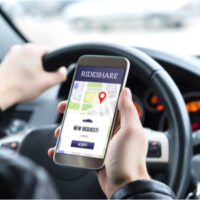The Three Periods of Rideshare Use and the Insurance that Covers Them

People throughout Florida use rideshare apps such as Uber and Lyft every day. These apps have been touted for their many benefits, including offering an affordable mode of transportation and giving people impaired by alcohol or drugs a safer way to get around. Unfortunately, the drivers and vehicles used for these apps are not immune to getting into a crash just like any other motorist on the road. If you have been in an accident that involved a rideshare vehicle, it is important to understand how rideshare insurance works, and how it affects you after a crash.
Rideshare Periods
Rideshare vehicles are considered a transportation network company (TNC) and have four different periods. They are as follows:
- Period 0: All drivers in Florida must carry the legal minimum amounts of auto insurance when they are on the road. Period 0 entails when a driver is not using a rideshare app in any manner.
- Period 1: This period covers the time when a driver has the rideshare app on and has not picked up a passenger, or agreed to pick up a passenger.
- Period 2: Period 2 covers the time in which a rideshare driver has agreed to pick up a passenger, but the passenger is not yet in the vehicle.
- Period 3: Once a passenger has been picked up by a rideshare driver, the driver and the passenger are in period three.
It is essential to understand these periods, and how they apply if you are in an accident with a ridesharing vehicle.
Insurance Coverage During Rideshare Periods
If you are in an accident that involves a rideshare vehicle, it is important to know what insurance coverage will provide accident benefits to help with your medical expenses, lost income, and more.
When a rideshare driver does not have their app turned on, the vehicle is considered in use for personal reasons. As such, when the vehicle is involved in an accident at this time, each driver will go through their own insurance company to claim coverage, as Florida is a no-fault insurance state. In limited circumstances, an accident victim may be able to file a claim against the at-fault party if they have sustained a severe or permanent injury.
During period one and period two, when the rideshare driver has the app turned on but does not have a passenger in the vehicle, the coverage provided to accident victims is a mix of insurance. In these instances, the driver’s personal auto insurance will provide some coverage, as will a limited amount of coverage provided by the ridesharing company.
In the third period, when a rideshare vehicle is carrying a passenger, ridesharing companies such as Uber and Lyft provide a great deal more insurance. Both companies offer up to $1 million in insurance for accident victims when they were a passenger in a rideshare vehicle.
Injured in a Crash? Call Our Florida Rideshare Accident Lawyers
The aftermath of a car crash is always confusing, but things become even more complex when a rideshare vehicle was involved. At Eighmie Law Firm, P.A., our Port St. Lucie car accident lawyers work as advocates for accident victims. We will help you file an insurance claim with the appropriate company and give you the best chance of securing the compensation you deserve. Call us today at (772) 905-8692 or contact us online to schedule a consultation.
Resource:
uber.com/us/en/drive/insurance/
https://www.eighmielawfirm.com/when-should-i-speak-to-a-lawyer-after-an-auto-accident/
